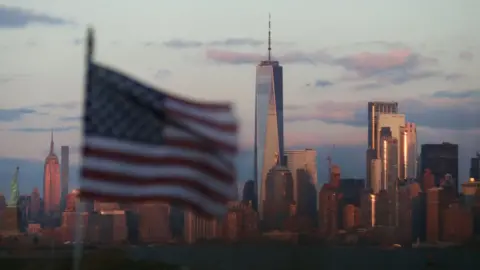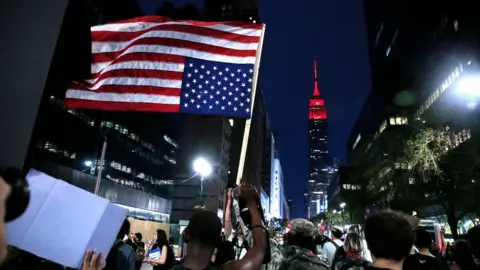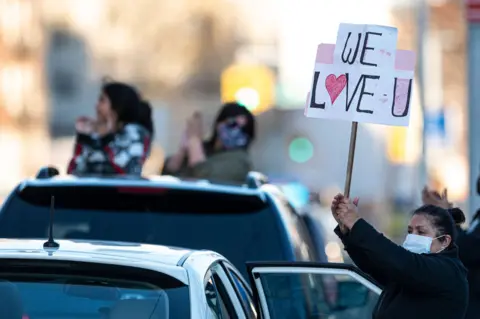A letter to our newborn American daughter

 Getty Images
Getty ImagesYou were born on the third night of curfew and in the third month of the Covid lockdown, entering the world as around us an epic history swirled.
When your mother went into labour, police helicopters circled above our apartment building. Our midwife's assistant was questioned by officers outside the door. And when we looked out of our window shortly after your birth, a convoy of New York squad cars darted over the Brooklyn Bridge towards the towers of Lower Manhattan, lights flashing scarlet and blue.
Every day for a week afterwards, a column of demonstrators made that same journey across the bridge; tens of thousands of them shouting the mantra of the movement, Black Lives Matter, Black Lives Matter.
You gulped your first lungfuls of air as protesters across America chanted "I can't breathe."
We opted for a home birth because you were born at a time when people were scared of hospitals. But in the nights beforehand, as roads were clogged with marchers and riot police formed human barricades across the bridges and major avenues within blocks of our home, we feared our midwife might struggle to reach us, and also that our routes to the nearby emergency rooms might be cut off.
Having been forced into hibernation by a viral onslaught that killed more than 17,000 New Yorkers, parts of the city were now paralysed by protest.
Both your mother and I had suffered from coronavirus, a disease we had never heard of at the start of this fateful year. And even in the womb you would have felt the violent convulsions of her body; heard the coughing fits that left her breathless; maybe even sensed her adrenal dread of hospitalisation.
 Getty Images
Getty ImagesSo you might well have been conscious of our heightened state of anxiety. After months of living in the worst-affected city in the worst-affected country, it had become habitualised. Your older siblings will tell you that your father is a "worrywart." But alas, the curse of being a foreign correspondent is to have witnessed too many worst-case scenarios.
At bedtime for weeks beforehand, I read your mother birthing visualisations - soothing and near-hypnotic words designed to comfort our anxious minds. But your birth story felt more like it came from the pages of the classic correspondent novel The Year of Living Dangerously. And tragically, that is what 2020 had become.
Usually parents cry tears of joy when first they see their newborn. For us, they came with a flood of relief. Your safe arrival marked the lifting of months of mental siege; respite after sleepless nights of pre-traumatic stress.
If the contagion makes sense of the masks, the quarantine, and why the faces of well-wishers appeared on screen in a computerised grid, then what explains those protests? The column of demonstrators outside our window that became as regular as your feeds. The chants that almost drowned your cries. Well, in the midst of the pandemic, a video went viral.
It showed a black man, George Floyd, being suffocated by the knee of a white police officer; a killing that lasted almost nine minutes; an allegedly murderous act that came to epitomise how African-Americans have long been held down and smothered by systemic racism.
The fires of fury were quick in coming, the most widespread racial turbulence since the summer of my own birth in 1968. America found itself confronting three simultaneous convulsions: a health crisis that disproportionately affected people of colour; an economic shock that disproportionately affected people of colour; and civil unrest sparked by police brutality that has always disproportionately affected people of colour. A shattered mirror was being held up to a fractured country.
Nor was this racial reckoning confined to America. In Australia, where your older brother and sister were born, thousands protested against the treatment of Aboriginal people, the long suffering victims of white colonisation, of British colonisation.
In my beloved hometown, Bristol, protesters pulled down a bronze statue of a slave trader, and then dumped it in the harbour where his prison ships once docked.
For most of my adult life, America's racial breach has been something of a personal obsession. I've journeyed through the American south, visiting the climactic battlegrounds of the struggle for black equality. I've sat down and talked with the activists who were beaten and clubbed. I've sifted through the archives of the white supremacist politicians who tried to uphold the system of racial apartheid that separated the races from the cradle to the grave.
In this quest for understanding, I came to learn that the civil war waged on this soil more than 150 years ago never truly came to an end, and that racial division has always been America's default setting. I can tell you that the turbulence we witnessed in the week of your birth was not some aberration but part of an unbroken historical thread.
All this I know and understand. Yet the one thing I will never be able to explain to you is what it feels like to walk in a black person's shoes.

Read more from Nick

What I can tell you is that your pigmentation confers privilege. It grants you the presumption of innocence. It offers a large measure of protection if the car we're driving in is pulled over by police. The strong likelihood is that you will live longer than a black baby born on the same night; earn more money for the same work; stand a better chance of completing your education and graduating from university.
Too often, we tell ourselves a comforting story of racial progress. Of one-time segregationist citadels now run by black mayors. Of a prosperous black middle class. Of a young African-American president who occupied a White House built by enslaved workers. But the truth is the struggle for genuine black equality might never attain its goal. The dream may forever be deferred.
At this time of personal joy, I realise I sound despondent. So I should tell you about my love of America, an infatuation that started long before I came here as a teenager in the mid-Eighties. Having grown up in a country where too many people were resigned to their fate from too early an age, I revelled in its sense of possibility: that animating belief in personal and generational advancement that we call the American Dream.
Never have I shared the knee-jerk anti-Americanism of many of my fellow Europeans. Having spent more of my adulthood here than in Britain, there were times when I would happily have taken up citizenship myself.
But I admit now to having conflicted feelings that you were born in the USA; that you will be able to travel the world with an eagle on your passport. This is not the country I fell in love with as a child. The words United States of America now sound like a misnomer, an oxymoron.
The notion of American exceptionalism, far from being awe-inspiring and emulative, has become a negative construct - something we associate with mass shootings, unsafe schools, police brutality, a politics unhinged.
Since the turn of the new century we have spoken of a post-American world. But my fear is we are facing a post-American America: a country in an irreconcilable state of division and decline; a broken superpower in a broken world.
 Getty Images
Getty ImagesIt was striking in the days after your birth how many friends and relatives thought you should be called Hope. The brightest of rays in the darkest of days, people seemed to look upon you as destiny's child. But it's not your job to fix the world's problems for us, it's our urgent responsibility to fix them for you: the climate emergency; the disparities of wealth and opportunity; sexism and sexual violence; the racial breach; the Pandora's Box of artificial intelligence and autonomous weaponry; the transnational challenges that make all of us global citizens.
Before too long, I hope New York will return to its charismatic self, and you'll get to experience this epic global city. We'll see strangers smile - and scowl - again. Close friends and family will finally be able to cradle you in their arms.
But to be truthful, Honor, something I'm not hoping for is a speedy return to normal. Because one thing that's become glaringly evident during these months of global shutdown and these weeks of global protest - normal no longer works.
